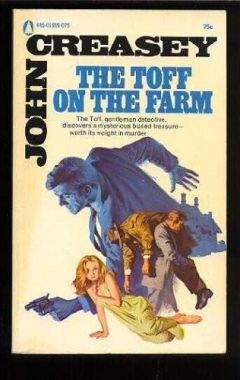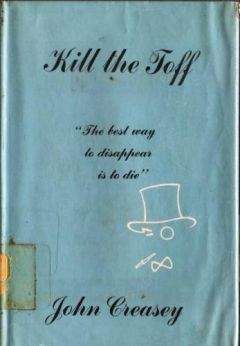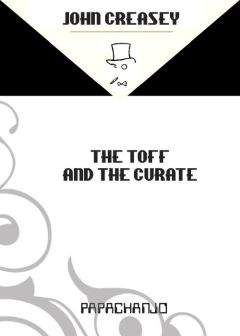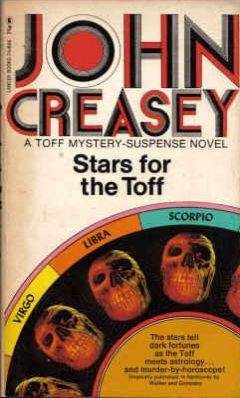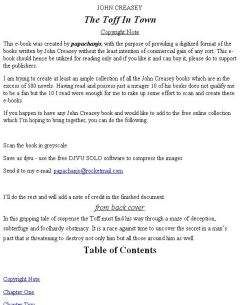John Creasey - The Toff And The Stolen Tresses
На сайте mybooks.club вы можете бесплатно читать книги онлайн без регистрации, включая John Creasey - The Toff And The Stolen Tresses. Жанр: Прочее издательство неизвестно,. Доступна полная версия книги с кратким содержанием для предварительного ознакомления, аннотацией (предисловием), рецензиями от других читателей и их экспертным мнением.
Кроме того, на сайте mybooks.club вы найдете множество новинок, которые стоит прочитать.
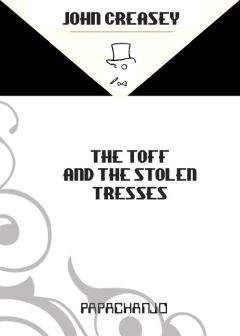
John Creasey - The Toff And The Stolen Tresses краткое содержание
The Toff And The Stolen Tresses читать онлайн бесплатно
“I hope they don’t have time to do much damage,” Rollison said with feeling, and winked at the driver of the patrol car. Then he walked rapidly towards Piccadilly, and took a taxi to Middleton Street, Chelsea. He had not yet seen the Blakes, who as far as he knew were the only people who might be able to explain the attack on Jimmy Jones.
He knocked at the door of Number 24, and immediately there was a response, but no elderly person opened the door; instead a solid-looking man, obviously a Yard man in plain clothes, barred Rollison’s path. Then he recognised the visitor, and sprang almost to attention.
“Thanks,” said Rollison, and smiled. “Old folk at home?”
“Oh, yes, sir.”
“How are they?”
“Oh, they’re much better now,” said the plainclothes man. “Nearest thing to a miracle I’ve ever seen.”
“Miracle?” echoed Rollison, blankly.
“That’s the word, sir! When I first saw them they looked ready to pass out, they hadn’t a stick left whole, and the fact that the neighbours were very kind didn’t make all that difference. Of course it helped, but—well, then this morning the new furniture and everything arrived. Wonderful lot of stuff, sir, and a bigger and better television set. Wonderful people, those Jepsons.”
“So the Jepsons did that,” said Rollison, and had a mental image of Ada, so dumb-blondish and yet so shrewd. “Bless their hearts. Ask the Blakes if they can spare me five minutes, will you?”
“I’m sure they’ll be glad to,” the plainclothes man said. “Mr. Blake’s in the kitchen, Mrs. Blake’s upstairs with Jimmy Jones and Miss Jepson. Didn’t you know Jones was back?”
CHAPTER ELEVEN
Transformation
In the small house there was transformation. Rollison could tell this as he entered the narrow hallway, saw the front room on the right filled with new furniture, a new carpet; everything a home needed. He could see the rough to the kitchen, and a small room also on the right; there was bright newness everywhere. An elderly grey-haired man stood up from a chair, and revealed a television set; it was as if he had been watching the blank screen.
He came forward.
“Mr. Blake, this is Mr. Rollison,” the plainclothes man said. The grey-haired man, with his clear skin and steady blue eyes, looked puzzled for a moment, and then exclaimed:
“The Mr. Rollison? The one they call the Toff?”
The Yard man chuckled.
“That’s him, Mr. Blake.”
“This really is an honour,” Blake said eagerly, and put out his hand, as if not certain that the Toff would take it; his grip was firm, his eyes told of his delight. “Martha will be delighted, she really will. Why, I must have been reading about you for twenty years!” He pumped Rollison’s hand again, and called: “Martha, Martha dear! Come on down at once, we’ve a visitor, you’d never believe . . .”
His wife was small, plump, comely and grey-haired; and obviously a little overwhelmed by the transformation and the generosity of the Jepsons. The Toff was gentle and understanding; and it was Blake who led him upstairs. He could hear Ada talking, in a quick, light voice, which suggested that she hadn’t a serious thought in her head; just prattle. Then Blake opened the door, and said:
“Jimmy, do you think you could stand another visitor for ten minutes?”
Ada jumped up.
“It’s past time I left, I didn’t realise I’d stayed so long, please don’t let me keep anyone away. I—” she looked past Blake at Rollison, and broke off, her eyes widening and her lips pursed in a little O as if of astonishment; that was the way she looked whenever she was really surprised. Then, swiftly and lightly, she went on: “But it’s Rolly! Rolly dear, how nice of you to come as soon as you heard Jimmy was out of hospital. Jimmy, this is Mr. Richard Rollison.”
“The Toff,” whispered Blake, as an echo.
Rollison looked at James Matthison Jones, and greatly liked what he saw, although much of Jones’s head was bandaged, and there was a plastered pad beneath his jaw on the right side. It was only a few days after the attack. There were bruises on his hands and his face which were not bandaged, but his mouth had not suffered, and his eyes were as clear and direct as a man’s could be.
“Hallo,” said Rollison, and took Jones’s hand. “Throw me out if you’re tired of talking, won’t you? Hallo, Ada, nice to see you.”
Jones seemed to find it difficult to make up his mind whether to look at Ada or at his new visitor. He compromised, smiling quickly at the Toff and then turning to the girl and saying: “Please don’t go. I’m perfectly all right now, and company’s good for me.”
“No, really, I must fly,” said Ada, “I’ve promised to see a friend before dinner.” She raised a hand to Jones, and turned and hurried out of the room, casting a swift sideways glance at Rollison. Blake went downstairs with her, and she chattered brightly all the way down, as if she could never be solemn and earnest.
Rollison stood by the open door and watched the man on the bed, who was now looking steadily at him, but his mind wasn’t on that job; it was on the girl, her lilting voice, perhaps on all that she had already done.
The front door opened and closed.
Rollison closed the door, and moved forward, and Jones said hastily.
“Oh, I’m sorry. Please sit down.”
“Thanks,” said Rollison. “Are you as well as you look?”
“Oh, I’m all right now,” said Jones. A new expression surged into his eyes, his jaw seemed to thrust itself forward, and he went on in a hard voice: “All I want is to catch up with those swine. That’s all.”
“I’d leave it for a few days,” advised Rollison lightly. “You wouldn’t like to hit a man when he’s down, would you?”
“I’d gladly knock the living daylights out of them, standing up, sitting up or lying down,” said Jones, in the same hard voice. “I wouldn’t worry about sentiment or the Queensberry Rules. They—” he broke off, and his voice squeaked. “Do you mean that the police have caught them?”
“No, but they ran into some trouble they weren’t expecting,” Rollison said. He let that sink in, enjoying the glint which sprang to Jones’s eyes, and went on before Jones could comment. “You must be sick of questions, and I haven’t come to worry you with many.”
“Ask anything you like,” said Jones, looking at him with a kind of admiration which could not be mistaken. “Did you actually catch up with them?”
“It was an accident,” Rollison assured him earnestly. “Does Villiers Street mean anything to you on the day of the attack?”
“Oh, yes,” said Jones. “I told the police about that.”
“They’re never sure that they ought to tell me that kind of thing,” said Rollison, sadly. “Mind repeating it?”
“Of course not. I first saw these two fellows in Villiers Street.”
“Do you always go that way home?”
“Usually.”
“They followed you from there, did they?”
“They must have done.”
“Had you seen either of them before?”
“No.”
“No threats or menaces?”
“No.”
“Any idea at all why they should set upon you?”
“Mr. Rollison,” said Jones, leaning forward to add vehemence to his words, “I’ve told the police and I’ll tell you now that I haven’t the faintest idea what it was all about. As far as I know, I’ve no enemies. As far as I know none of my friends is associated with brutes of that kind. I can only believe that I was mistaken for someone else.”
Rollison put his head on one side.
“You look moderately individualistic to me.” Jones grinned.
“You know what I mean!”
“Yes, I think so. Could this have anything to do with your work?”
“I don’t see how it possibly could,” answered Jones, thoughtfully. “The police asked me that. As far as I can tell, everything at the office is perfectly straightforward. My money’s on a case of mistaken identity, Mr. Rollison, although I know you’ll probably say that it’s the easy way out.”
“Could be,” conceded Rollison. “Where did you see these men in Villiers Street?”
“About half-way up—near Lytton Street and the barber’s.”
Rollison felt the sharp impact of that remark, but hoped that he had not allowed Jones to see that it startled him.
“Your regular barber’s?”
“No. It’s a bigger salon than several of them around there, and more expensive. I’d been there for a haircut only that day, and can remember every incident clearly. The chap who’d cut my hair was on the corner as I went by in the evening, and nodded to me. Italian type. I went straight up towards the Strand. I passed a small fellow, and there was a bigger chap a little way ahead. I saw him again at a bus stop, and he got off at the same stop as I did. He was the fellow who really began to knock me about,” Jones said feelingly. “And one of these days—”
“I know. Was there anything special about the day’s haircut?”
Jones looked puzzled. “What can be special about a haircut?”
Rollison chuckled.
“I know what you mean! Did anything unusual happen? Did you see anything change hands, for instance, or hear a conversation that might be private?”
“The only unusual thing was that I picked up a leaflet giving details of a beautiful hair competition,” Jones said. “There’s a girl in the office with lovely hair, and I thought it would interest her. So I took one of the leaflets away with me.”
“Was the girl interested?” Rollison asked, as if this meant absolutely nothing, and the competition was quite new to him:
“Yes.” Jones looked rueful, but didn’t explain why. “That can’t possibly have anything to do with the attack on me, though. I simply took this leaflet and gave it to Goldilocks. And she—”
“Goldilocks?”
Jones grinned.
“If you ever meet her, don’t call her that or she’ll probably slap your face. She has wonderful golden hair, and everyone calls her Goldilocks except to her face. For some reason she hates it.”
“What’s her real name?” asked Rollison, and tried to make that question seem casual, too.
He did not succeed. This young man was as sharp as they came, and would not easily be persuaded that Rollison would ask questions for the sake of them. He could see that Rollison’s interest in the girl Goldilocks was deeper than that in the rest of the story. He did not answer for some seconds, then said very quietly:
“She’s Evelyn Day, who works in the Buying Office at Jepsons. She couldn’t possibly know anything about this business.” He was almost too emphatic, but did not volunteer any more information. Although he had answered all the questions quickly, and although his mind obviously worked at speed, he was looking pale and tired.
“Of course she can’t,” Rollison said soothingly, “but unless I see the whole picture I can’t hope to get any results.” He stood up. “Is there anything else you’d like to tell me?”
Jones said quietly: “No, Mr. Rollison, but there’s one thing you can do for me.”
“What’s that?” Rollison expected some plea for the name and address of the assailants.
“If you see Miss Jepson, or her brother for that matter, tell them how warmly I appreciate what they’ve done, will you?” said Jones. “It was magnificent. They’re always very generous, everyone who works for Jepsons is devoted to them, but this—” Jones sounded choked and looked about the room. “I know some people would say that it didn’t cost them much, Jepsons could furnish a dozen homes from stock and not notice it, but that isn’t the point. Will you tell Miss Jepson?”
“I certainly will,” promised Rollison.
* * *
He left soon afterwards, drove to his club in Pall Mall, had a hurried dinner, and then telephoned Scotland Yard. Grice wasn’t there, but a superintendent on duty said:
“Yes, Mr. Rollison. Four youths broke into your flat, and we caught them red-handed. Said they were looking for Mrs. Wallis. We got ‘em before they did any damage at all. In fact the only breakage was a glass, one of them had helped himself to a whisky and soda, and threw the glass at our chaps. It broke against the door. They’re being held at Great Marlborough Street, and they’ll be up for a hearing in the morning.”
If the magistrate remanded ‘em for eight days, that would be four of the enemy out of the firing line,” said Rollison hopefully.
“Wouldn’t surprise me if Grice is planning just that,” the superintendent said. “Or you are!” He gave a throaty chuckle.
Rollison rang off, then dialled a Mayfair number, and was answered by a man with a deep and resonant voice, the voice of a gentleman’s gentleman, a butler beyond all reasonable doubt. His name was Forbes, and he had served the Jepson family for nearly half a century.
“One moment, sir, I will find out if Miss Ada is in.”
Rollison held on, staring along the marble passage of this club, with its statues and its oil paintings of past members, its marble columns, its decorated ceiling, and its reminder of a dying age, for two women came walking along the passage with a man, quite animatedly.
“Mr. Rollison, sir,” the voice said. “Miss Ada is in and will be glad to see you if you call.”
* * *
The Jepsons lived at Maybury Square, one of the smaller squares which was still mainly residential. For a London house of the late Regency period it was not large, but it had much charm. The hall, the staircase and the rooms were furnished as they had been sixty or seventy years ago, and there was an air of good taste and yet a hint of opulence in the manservant—not Forbes—who opened the door. Rollison caught a glimpse of a dining-room with great Waterford glass chandeliers hanging low over a table which could seat a dozen on either side.
Ada came hurrying down the stairs, bright-faced and eager.
“Rolly, darling, how sweet of you to come! I called your flat several times but there was no answer, so I supposed you were out after all these bad men again. Have you got any results yet?”
“Give me time,” pleaded Rollison.
“Well, it’s your own fault if I expect miracles, you’re always performing them.” Ada put a cool hand on his arm and led him along a quiet passage to a small room, of much charm, with its green and gold, its books and pictures, and the tapestry stretched over a frame with wools of a hundred colours and shades in a box divided into tiny sections. Half-a-dozen needles, all threaded, were stuck in the tapestry, and a picture of a woman’s face was already half-formed. Over the mantelpiece was an oil painting of the same woman; Rollison knew that this was Ada’s mother who had died several years ago.
“Do sit down, and tell me what you’ll have,” said Ada. “Brandy or a liqueur, and a cigar . . .”
So, she fussed; and when liqueur and a cigar were at Rollison’s side, she went on: “Isn’t Jimmy Jones a pet?”
“It wouldn’t surprise me if the last thing in the world he’d want to be is a pet,” said Rollison.
Похожие книги на "The Toff And The Stolen Tresses", John Creasey
John Creasey читать все книги автора по порядку
John Creasey - все книги автора в одном месте читать по порядку полные версии на сайте онлайн библиотеки mybooks.club.
